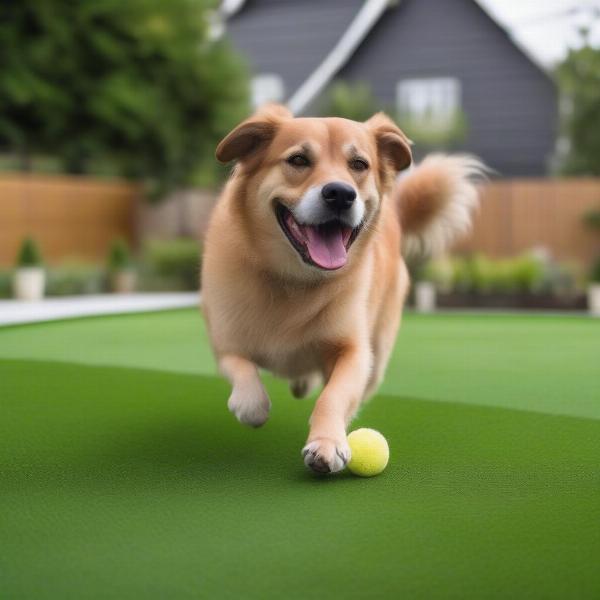Artificial grass offers a low-maintenance alternative to natural lawns, but many dog owners wonder, “Can dogs pee on artificial grass?” The simple answer is yes. Dogs can pee on artificial grass without harming the turf itself. However, there are important considerations regarding hygiene, odor control, and potential long-term effects that owners need to be aware of. Let’s explore the ins and outs of dogs and artificial grass.
Understanding the Impact of Dog Urine on Artificial Grass
While artificial grass can withstand dog urine, the real concern lies with the lingering smell and potential bacteria buildup. Unlike natural grass, which absorbs and filters urine, artificial turf doesn’t have the same capacity. This means that urine sits on the surface, creating an environment ripe for bacterial growth and unpleasant odors if not properly cleaned.
Furthermore, the backing material of artificial grass can retain urine, exacerbating the odor problem. This is especially true for older artificial grass installations or those with inadequate drainage. While the synthetic fibers themselves are resistant to urine damage, the backing can degrade over time with repeated exposure.
Maintaining a Clean and Odor-Free Artificial Lawn with Dogs
Regular cleaning is key to keeping your artificial grass fresh and hygienic when you have dogs. Simple rinsing with water after your dog pees will help dilute the urine and prevent immediate odor. For more thorough cleaning, a mixture of water and pet-safe detergent can be used. There are also specialized artificial grass cleaners available that are designed to neutralize odors and break down organic matter.
Another effective method is to use a dog pee enzyme cleaner designed specifically for pet urine. These cleaners contain enzymes that break down the uric acid in urine, eliminating the source of the odor rather than just masking it. Regular application of an enzyme cleaner, especially in frequently used areas, can significantly reduce odor buildup.
Choosing the Right Artificial Grass for Dogs
If you’re considering installing artificial grass and have dogs, choosing the right type of turf is crucial. Look for artificial grass with good drainage capabilities to prevent urine from pooling. Permeable backing materials will allow urine to flow through, reducing the chance of odor and bacterial growth. Also, consider opting for antimicrobial artificial grass, which contains additives that inhibit bacterial growth.
 Dog Playing on Clean Artificial Grass
Dog Playing on Clean Artificial Grass
Addressing Common Concerns About Dogs and Artificial Grass
Can dog urine stain artificial grass? While uncommon, some cheaper or older artificial grasses might stain from dog urine, especially if not cleaned regularly. High-quality artificial grass is typically stain-resistant.
Is artificial grass safe for dogs’ paws? Yes, artificial grass is generally safe for dogs’ paws. However, it can get hot in direct sunlight, so it’s important to choose a lighter color turf or provide shaded areas during hot weather.
What if my dog eats artificial grass? While artificial grass isn’t digestible, it’s best to discourage your dog from eating it. If your dog consistently eats grass, consult with a veterinarian to rule out any underlying health issues. You might also consider using a patch of grass for dogs specifically for this purpose.
Conclusion
So, can dogs pee on artificial grass? Absolutely. With proper care and maintenance, including regular rinsing and the use of enzyme cleaners, you can enjoy the benefits of artificial grass without the worry of unpleasant odors or hygiene issues. Choosing the right type of artificial grass is also essential for long-term satisfaction and ensuring a healthy environment for your furry friend. Don’t hesitate to invest in high-quality artificial grass and appropriate cleaning solutions for a truly worry-free experience. If you are concerned about the ongoing odor issue, check out our article on artificial grass stinks of dog pee. For those with puppies experiencing accidents indoors, you might find our article on dog tears up pee pad when left alone helpful.
FAQ
- How often should I clean artificial grass if my dog pees on it? Rinsing with water should be done after each urination, while a more thorough cleaning with detergent or enzyme cleaner is recommended weekly or as needed.
- Can I use bleach on artificial grass to remove dog urine odor? No, bleach can damage the artificial grass fibers and is not recommended.
- What is the best way to remove stubborn dog urine stains from artificial grass? A specialized artificial grass stain remover or a paste of baking soda and water can help lift stubborn stains.
- Does the type of infill affect how dog urine interacts with artificial grass? Yes, some infills, like silica sand, can absorb urine and contribute to odor. Consider using infills designed for pet owners.
- Is it safe for my dog to play on artificial grass after it has been cleaned with an enzyme cleaner? Yes, enzyme cleaners are pet-safe once they have dried.
- Can I train my dog to pee in a specific area of the artificial grass? Yes, you can train your dog to use a designated potty area just like you would with natural grass. Consider using fake grass and dog pee training aids.
- Is artificial grass a good option for dogs with allergies? Yes, artificial grass can be a good option for dogs with grass allergies, as it eliminates the allergen source.
About ILM Dog
ILM Dog is your trusted resource for expert dog care advice, offering guidance on everything from breed selection and puppy care to senior dog health and training. We provide practical, up-to-date information to help you make the best decisions for your canine companion. Whether you’re looking for tips on nutrition, grooming, or finding the perfect accessories, ILM Dog is here to support you throughout your dog ownership journey. Contact us at [email protected] or +44 20-3965-8624 for personalized advice and recommendations.